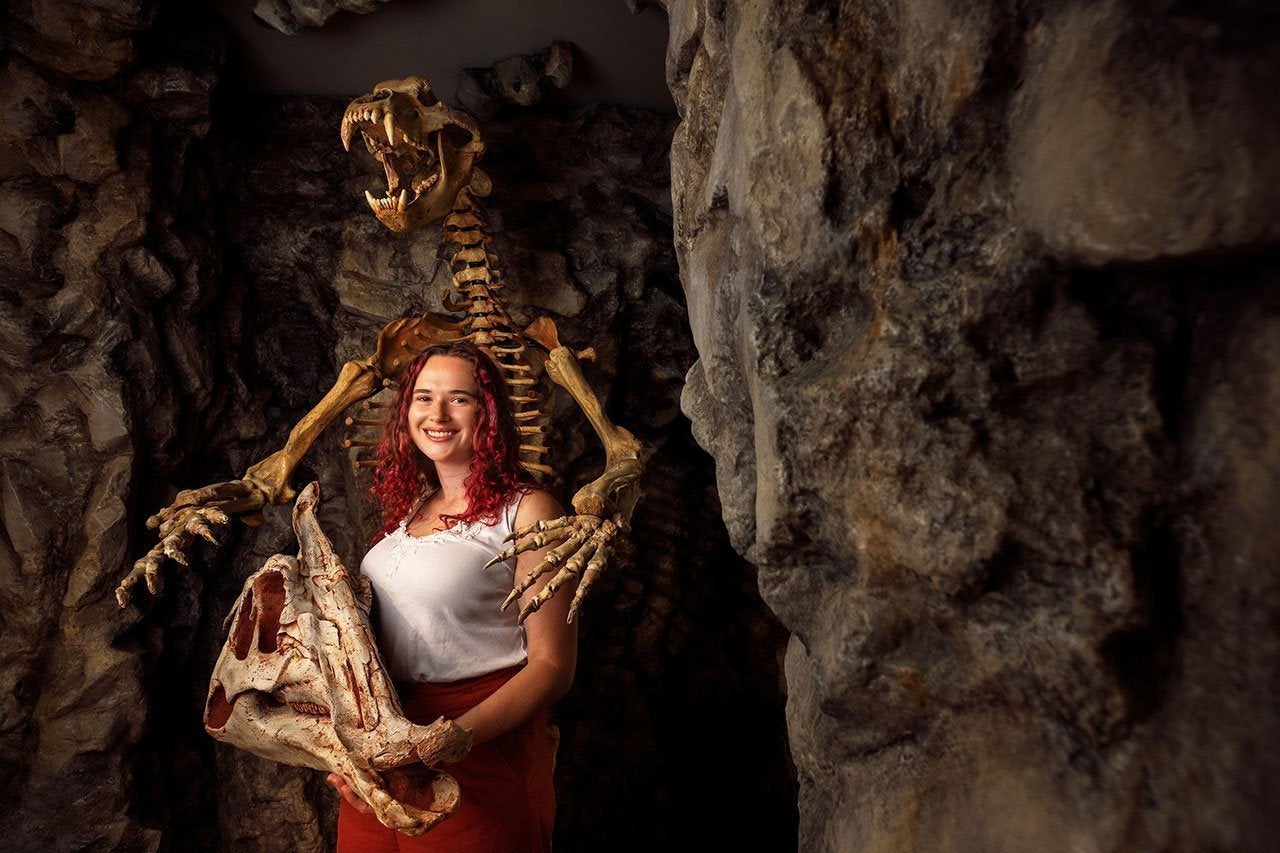Above: Geology and Spanish double-major Camille Sullivan is the first recipient of the new Paleontology Scholarship funded by donors and visitors to the Mace Brown Museum of Natural History.
Just inside the front door of the Mace Brown Museum of Natural History on the College of Charleston campus is a big glass and wood donation box. Perched on a block inside, amid a few dozen one-, two- and five-dollar bills, is a plaster cast of a cave bear skull with a sign that says “FEED ME!”
While much of the money visitors donate will go to support the museum’s top-quality fossil displays and educational outreach programs, a good chunk of it is going to support CofC’s first-ever Paleontology Scholarship. So, in essence, you’re not just feeding the museum; you’re feeding a future paleontologist perhaps.
“This is the first crowd-funded scholarship that I’ve ever heard of,” says Tim Callahan, chair of the Department of Geology and Environmental Geosciences who came up with the idea. “What I think is fun about it is that none of our gracious donors and visitors will be expecting us to turn around their donations to support a student.”
That student in question is senior geology and Spanish double-major Camille Sullivan, who will receive $2,500 for the 2021-22 school year.

Scott Pearsons, assistant professor of geology, is the curator of CofC’s Mace Brown Museum. (Photos by Heather Moran)
“I feel very honored,” she says. “I’m sure a lot of people applied for it, so I am very honored that Dr. Scott Persons and others chose me for this scholarship, that they thought of me that way. I’m glad that people see potential in me and that I can prove myself to them.”
An Honors College student, Sullivan was outstanding in Person’s paleobiology class, which she took last spring semester. “She’s an all-star as far as her grades,” he says. “We really couldn’t have asked for a more qualified and ideal candidate for the scholarship. She has tremendous intellectual curiosity.”
And versatility. Sullivan spent her summer working with Associate Professor Adem Ali on the causes of algae blooms in Lake Huron’s Saginaw Bay. They spent a week there in June collecting samples to study, along with satellite imagery and computer modeling, to come up with different algorithms to predict when blooms will occur.
As for paleontology, she loves the stories that are associated with the study of it.
“I really like how connected everything is and how there is an explanation for everything,” she says. “There’s a reason why this dinosaur’s footprints are a certain length apart or why this mammal had this kind of teeth. The way Dr. Persons taught the class, we understood the details and context surrounding everything. How all these details culminated together to produce the organisms and the animals throughout the eons is just fascinating to me. Memorizing everything, not as fun, but just being able to understand the stories and the explanations of why this happened the way it did, I really enjoyed that.”
As part of the scholarship, Sullivan is working as a docent at the Mace Brown Museum, appropriately. “It’s amazing that my scholarship was funded by donations from visitors,” she says. “I really like the way the museum is spaced out chronologically, so you see the full progression of organisms and the environment throughout history. It’s very logically pleasing to me.”
The collection and research capabilities of the museum is a big attraction to budding paleontologists like Sullivan, and the Paleontology Scholarship just takes that up another notch.
“Paleontology is something that the College of Charleston is really situated to do extremely well,” says Persons, who is the museum’s curator. “We have a grand natural history museum here that gives undergraduate students the possibility to get their hands dirty and work directly on fossil specimens. When I was in high school, I was very frustrated by the lack of places where I could pursue my passion for paleontology as an undergrad. If the College of Charleston was in the spot where it is now back then, it would have been at the top of my list, no question about it.”




